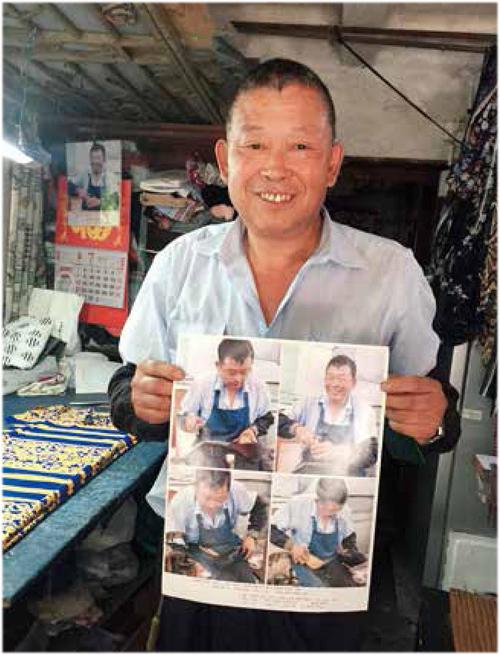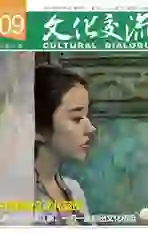菲律宾老记者情系杭州聋哑人修鞋匠
2018-09-06张姝
张姝
菲律宾八旬名记者许克强,三年前来杭州,因为鞋子坏了,而邂逅了聋哑人修鞋匠陶炳潮,并用照片记录下陶炳潮的修鞋老手艺。陶炳潮的“真”手艺、“真”态度、“真”感情,令他感动。
近日,笔者受这位菲律宾老人的重托,寻访修鞋摊,寻找这位让他念念不忘的聋哑人修鞋匠。为什么一位修鞋匠如此让人惦记呢?在寻访的过程中,笔者找到了答案。
菲律宾记者寻找杭州修鞋匠
八月的上午,烈日直射在杭州湖墅南路文晖路口的柏油路上,一脚踩下去,热量透过鞋底,直达脚心。
小河东村29幢楼下,楼房阴影里支着一把大遮阳伞,伞下,一位老修鞋匠正在为客人修补鞋子。“陶大伯!”有居民路过,对着老修鞋匠大声打招呼。老修鞋匠看着对方,憨厚地笑了笑。修鞋摊前的招牌上只有5个字:修鞋,聋哑人。
这就是聋哑人修鞋匠陶炳潮。
笔者走上前,向聋哑人修鞋匠自我介绍,并在手机上翻出许克强的照片向他问候。修鞋匠瞬间兴奋起来,喉咙里发出“哇哇哇”的声音,双手激动地比划着。原来,三年过去了,陶炳潮心里也有一份对许克强的惦记。
许克强,现年已八旬,是一位菲律宾名记者,长期担任菲律宾全国记者联合总会会长,也是菲律宾全国新闻工作者协会国际联络部共同主席及中国事务部主席。中菲建交初期,许克强为中国商品打开菲律宾市场作出了重要贡献。而今天的人们能在菲律宾看到中国影视片,其中也有许克强的一份功劳。他为取消中国影视片不得在菲播放的“禁令”四处活动,竭尽全力,最终使中国影视片得以在菲律宾顺利播放。
从1975年起,许克强开始义务接待一批批到菲律宾的中国访问者,其中就有很多浙江地区的记者。他作为中国与菲律宾两国的友好民间使者,也经常来中国,其中特别喜欢的是杭州。
三年前,许克强到访杭州,走在街上时鞋子壞了,朋友介绍他到旁边的修鞋摊修补,于是便邂逅了聋哑人修鞋匠。修鞋过程中,这位曾在菲总统府驻点采访50年的老记者,用随身相机“咔嚓咔嚓”为修鞋匠拍了一组照片,并问清了修鞋匠当时的地址,精修照片后寄给了他。关于修鞋匠,许老发给笔者的微信中评价道:“他每天一部小车带着生计工具来到这个角落,不管烈日严寒,刮风下雨,坚持为大家服务,非常令人感动。”
许克强回到菲律宾后,对聋哑人修鞋匠人念念不忘,还寄过照片给他,后来两人断了联系。因为心中惦念,于是许克强想再联系上修鞋匠。这份惦念,既是他对杭州这个地方浓浓人情味的怀念,更寄托了他的一份友谊。从一位新闻工作者的角度来说,许克强也很想记录下这个修鞋老手艺。
过去,人们衣食住行都离不开双手——破衣服上妈妈打的补丁;临行前外婆包的一顿饺子;爸爸给自行车链条滴油,载着我们兜兜风……如今,人们的各类需求都交给了机器,老手艺似乎成为了一种文化与情感的载体。但是,无论社会如何变迁,时代如何发展,老手艺人和人们之间亲密无间的情感,总是特别地动人。
无声服务里透着三个“真”
修鞋摊所处的文晖路口是个热闹地,行人车辆整天川流不息,烈日下也不见消停。可是笔者站在这聋哑人修鞋匠的大遮阳伞下,却慢慢感到“清凉”起来。
这份“清凉”其实是一种内心的舒爽,源于过往居民的真诚微笑。修鞋摊安在小河东村29幢楼下,只要是路过这里的居民,无一例外都会朝陶炳潮笑笑。他们有的还会打个招呼,叫一声陶大伯,修鞋匠一律报以憨厚的笑容。
看得出来,大家对他都非常熟稔且真心喜爱。
陶炳潮在半道红一带修鞋已经37年了,是这一片居民的老朋友,亲近如家人。
居民们你一言我一语地说着陶大伯的往事,话里话外,离不开3个“真”——
第一“真”,手艺“真”。需要修补的鞋子,他会仔细观察鞋子的问题,然后根据鞋子损坏的情况不同,一一找到适合的修补替换品。有些是相近颜色的皮革,有的是款式相仿的鞋跟。
第二“真”,态度“真”。有的鞋子表皮磨损了,他会反复检查,小心翼翼地修补涂漆。每个环节每个细节都不折不扣,修补完的鞋子焕然一新。
第三“真”,感情“真”。他待人很真诚,小修小补一般不收钱,需要大动的,价格也很实惠,一般也就五块钱。他的修鞋摊也是附近居民或路人的休息点,陶师傅总是笑眯眯的,大家也爱在这里乘个凉、歇口气。居民丁阿姨说:“我儿子打小穿的鞋子都是在陶师傅这里修的,现在儿子读大学了,放暑假回来也把穿破的球鞋带回来给陶师傅补。”
在采访过程中,笔者也真切地体会到了陶炳潮的三个“真”。
小河东村29幢居民王先生拿着一只凉鞋找到陶大伯。鞋是王先生女儿的,没啥大毛病,就是鞋带老化,断了。陶大伯接过鞋,仔细看了看,然后拿起针线,麻利地缝补起来。几针的工夫,鞋带便接上了。
还有一位到文晖路办事的张先生,下公交车后走了才10分钟,鞋子便被地面烤得脱了胶。“我看到路口有‘修鞋的红字招牌,就走过来了。”张先生将鞋子交给陶炳潮,站在遮阳伞下吹风歇脚。鞋子脱胶对于陶炳潮来说是小活,前后捣鼓了几分钟,张先生的鞋子便粘好了。
张先生准备掏钱,陶炳潮看着眼前的年轻人笑笑,摆摆手,意思是不用给钱了。张先生先是一愣,再仔细看招牌,这才明白了他的意思,再三感谢后才离去。不赚钱,陶炳潮也肯干。
一段跨越国界的淳朴友谊
与陶炳潮面对面久了,笔者有点后悔自己没事先学一些手语,陶大伯的很多意思,都不能准确地领会。好在周边的居民对他熟悉得很,从他们口中,笔者也能了解陶炳潮的故事。
21岁时,聋哑人陶炳潮孤身一人从绍兴陶堰镇来到杭州。一台修鞋机,一个装工具矮柜,两张折叠小凳子,成了他的全部家当。他的老伴来自千岛湖,也是聋哑人。这门亲事还是当年修鞋摊旁某电影院的工作人员做的大媒。
成婚后,陶師傅家添了个大胖小子,孩子健康、听话,从小学习成绩就不错。一家人常年租住在大塘新村,陶炳潮和妻子每月有政府发放的生活补贴,加上他能靠手艺谋生,家庭生活不成问题。陶炳潮的儿子现就读浙江工业大学,下半年读大四了,读的是计算机专业,希望毕业后就在杭州工作。
37年过去了,小陶变成了老陶,不变的是,这么多年来他始终开朗乐观,勤勤恳恳。
陶炳潮家里挂着的一张照片,就是当年许克强给他拍的工作照。他笑眯眯地举着照片让笔者用手机给他拍了一张,也让笔者把问候捎给远在菲律宾的许克强。
当笔者把寻访到修鞋匠的好消息告诉许克强后,他非常关心陶炳潮的近况。得知他们一家生活不错,许克强在给笔者的微信语音里夸赞道:“非常敬佩像陶师傅这样的中国普通老百姓的自强不息和乐观奋斗的精神。”他说,他期待再次来访杭州,他也会继续努力推动菲律宾、海外的侨商与中国的合作以及新闻媒体之间的互动交流,以促进两国的友好往来。
大都市,小角落。一对聋哑夫妇,一个励志儿子。陶炳潮一家人,通过勤劳的双手把小日子过扎实了,真好。
而陶炳潮和许克强之间跨越国界的淳朴友谊,也温情如潺潺流水,沁人心脾。
Friendship between Journalist and Cobbler
By Zhang Shu
Xu Keqiang, a Filipino journalist now in his 80s, came to cover G20 Hangzhou Summit in 2016. During his coverage tour around the city, one of his shoes malfunctioned. A street cobbler named Tao Bingchao repaired the shoe. The journalist photographed the show-repairing and photographed Tao. They chatted and became friends. The other day this year, Xu contacted me from the Philippines in a bid to find Tao Bingchao, a man who is a deaf-mute. The journalist knows where Tao operates his cobbler business, but cant keep in touch with the physically challenged man through normal communication channels.
In the last August, I went to visit Tao. I found him easily. In the shade of an apartment building in a residential community, he sat beneath a large sun umbrella. A plaque in front of the cobbler business explains the business to the point: shoe-repairing; deaf-mute.
I went forward directly to him and introduced myself. When I showed the cobbler the photos of Xu Keqiang, Taos facial expression instantly became vivid. He uttered a few guttural sounds from the throat and gesticulated excitedly.
Xu is a prominent journalist in the Philippines. In the first few years after China and the Philippines set up diplomatic relations, he was a key player in opening the market of the island nation for Chinese commodities. He canvassed and successfully lifted a government ban on Chinese television and movies. Since 1975, he has hosted Chinese journalists visiting the Philippines, including journalists from Zhejiang Province. As a people-to-people friendship envoy between China and the Philippines, he visits China frequently and has developed a special preference for Hangzhou.
He met Tao Bingchao accidently in Hangzhou. The memory has stayed with both of them. Through WeChat, the most popular social media in China, the journalist told me why he has kept the cobbler in his heart: “He comes to the corner everyday despite rains and winds, cold and hot days and he provides a service to people. What he does touches my heart.”
After his return to the Philippines, Xu sent Tao a set of photos he took in Hangzhou while the cobbler was repairing his shoe. Then the contact was lost. Then Xu contacted me for a visit to Tao again. As a journalist, Xu wants to document the experienced cobblers craft in a city where modernity is increasingly overwhelming.
Tao Bingchao has operated his cobbler business in the neighborhood for 37 years. The local residents know him and treat him as a family member. During my visit to the cobbler, his neighbors vied each other telling me why they love Tao. His craft is excellent. He knows how to repair shoes. He is a perfectionist in repairing shoes and sparing no efforts to make shoes look good and function good. His sincerity toward his neighbors is heart-touching. For small fixes, he doesnt charge a cent. For big fixes, he charges 5 yuan, which is less than a US dollar.
While I was there, some neighbors brought shoes out for Tao to repair. A pedestrian came in. It turned out that he rode a bus to the neighborhood on a business errand but the shoes couldnt stand the scorching heat of the sideway bathed in the summer sun. The shoes went unglued. In despair, he saw the sign and came in. just in a few minutes, Tao glues the shoes back. He didnt charge a cent. Surprised, the young man looked up at the sign and looked back at the cobbler. Tao smiled and waved his hand dismissively. The young man thanked Tao again and left.
Tao came to Hangzhou from Taoyan Town in Shaoxing in eastern Zhejiang at the age of 21. All the assets he brought to the city was a sewing machine for repairing shoes, a short wood cabinet that contained all other tools, and two foldable stools. He set up his business at the gate of local movie house. He married a deaf-mute girl from Qiandaohu, a distant town from Hangzhou, thanks to the warm-hearted employees of the movie house. Soon they had a healthy baby boy. Now the couple lives in a rented apartment and receives monthly government subsidies. The son is a senior student majoring computer technology at Zhejiang University of Technology.
I sent Xu a photo of Tao I had taken at Taos home. In Taos hands are the photos Xu took in 2016. Tao asked me to say hello to Xu.
